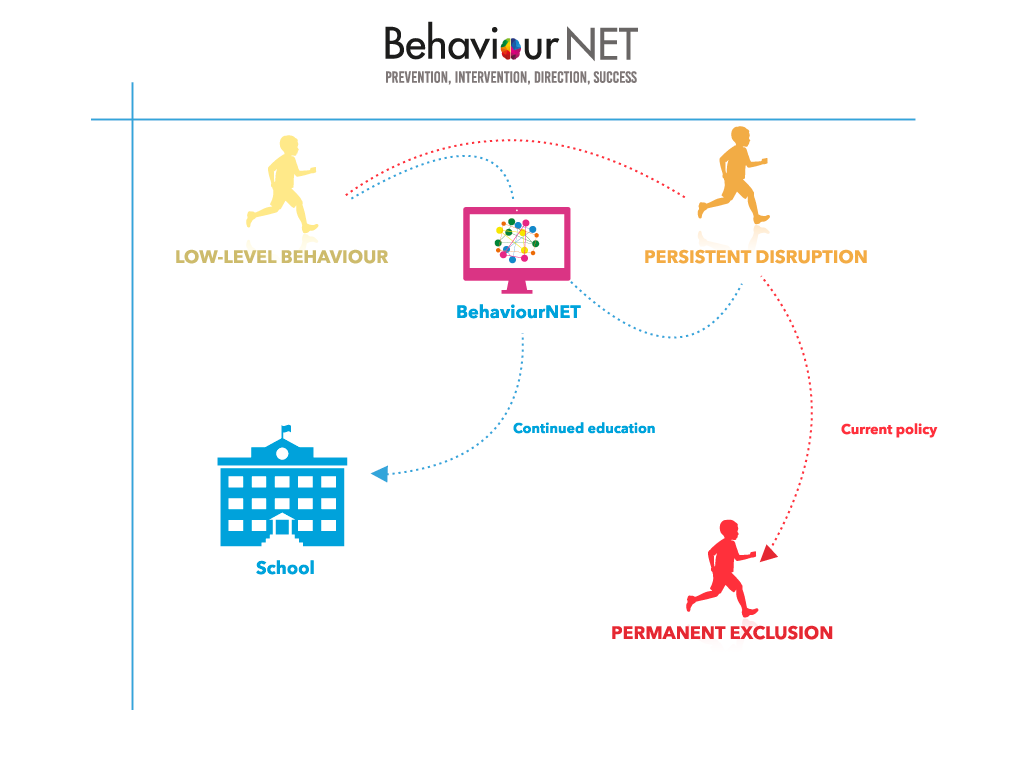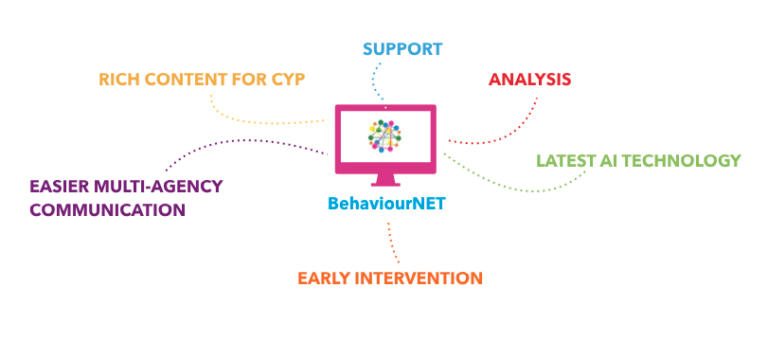BehaviourNet for Schools and Support Teams
By taking a comprehensive approach to behaviour management of young people at school, BehaviourNet offers a practical toolkit that empowers schools to deliver an additional layer of support to their students when they need it.
Using advanced technology we employ recognised, evidence-based cognitive behaviour processes to manage behaviour incidents. This enables more efficient use of the school, local authority and wider support resource’s time.


Intelligence gleaned by BehaviourNet may identify barriers to success or social mobility for the young person, such as mental health issues, safeguarding concerns and SEND requirements, which will highlight the need for intervention. This solution will reduce the resources used for behaviour management and enable the targeted reassignment of resources as needed. This could, therefore, have a positive impact on things such as pupil attendance, SEND applications for persistent disruption and reducing the number of permanent exclusions.
Teachers are Constantly Working Under Pressure
The escalation of negative behaviour, from low-level disruption to more common aggressive and antisocial behaviours, has seen schools and support staff struggling to cope.
Teacher surveys* found the vast majority of staff had recorded a rise in the number of children with emotional, behavioural or mental health problems. Below are some other significant findings from recent surveys:
- Pupils in English schools lose up to an hour of learning each day due to classroom disruption, adding up to 38 days a year.
- 70% of staff felt there were more children with emotional, behavioural and mental health problems than two years ago.
- Nearly 90% of educators and support staff revealed they had dealt with a challenging or disruptive student during the school year.
- Concerning staff alone, over 50% revealed they have suffered stress and almost a quarter said they had lost confidence at work.
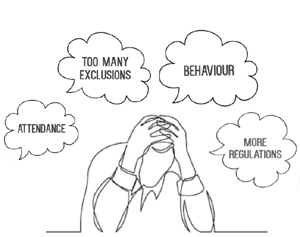
Why Schools will Benefit from BehaviourNet
Behaviour analysis can guide schools to prioritise prevention, intervention and to respond to behavioural events in more effective ways. Our belief is there is a strong requirement for a behaviour management tool that will ease the collection and processing of data to aid schools in advancing their prevention and intervention methods. BehaviourNet facilitates a range of appropriate proposed actions in accordance with statutory requirements, enabling a secure and safe school environment which benefits the whole school community.
Over the past few years technology has rapidly progressed. Our platform enables teachers to record any learning experience, including informal learning, which often provides a much richer and contextual picture of an individual’s learning path. This technology not only allows for pupils to carry out academic tasks in the school setting but also has the potential to develop inter-agency records and flag warnings on behaviour response patterns through its artificial intelligence capabilities.
The BehaviourNet platform delivers an objective, digital environment for young people and professionals to jointly manage educational, behavioural and socio-demographic issues that have a significant impact on the success of our education system.
BehaviourNet and Artificial Intelligence
Through machine learning and Artificial Intelligence (AI), the BehaviourNet software intuitively analyses student responses to digital materials. Through the use of Neural Networks, the system continuously learns and improves, delivering more sophisticated preventative and reactive solutions to behavioural events. We can, therefore, better understand behaviour patterns and risks, thus enabling improved interventions and support.
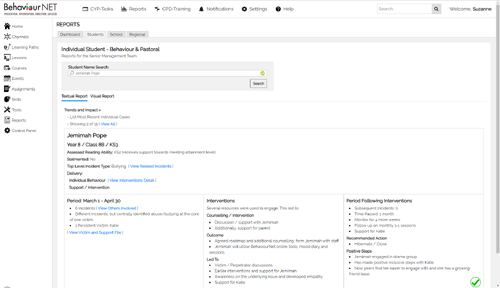
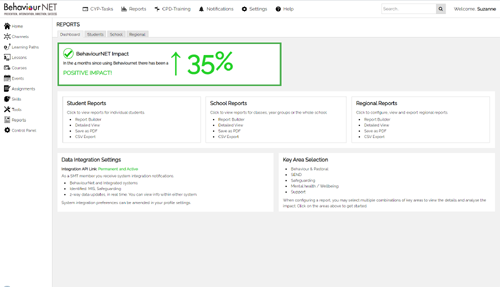
Access to BehaviourNet for Teaching Staff
Teachers, support staff and other relevant CYP professionals can access the system through a personalised, customisable dashboard. The interface design is simple to set up. Tasks like accessing student questionnaire results and learning activity responses are quick and easy to do with sophisticated reviewal capabilities. The software is designed to flag responses with highlighted concerns or notices and provides suggested interventions and methods for further support. The user-friendly interface will provide intelligent analysis, support, early intervention capabilities and improved multi-agency communication.
The development of increased resources and content gives us scope to include behaviour, social-emotional resilience, mental health, Special Education Needs (SEN) provision and formative assessment. The inclusion of child safeguarding, including indicators of abuse, county lines, government prevent agenda and online safety will significantly enhance this solution and its integration with third-party systems.
To visit the teacher / staff environment, click below:
Using Diagnostic Tools to Help Identify the Reasons behind Behaviour
Diagnostic tools will help professionals identify the reasons behind the increasing volume of mental health, behaviour issues and a range of additional needs in young people, providing:
- tools for developing emotional resilience, wellbeing and communication
- practical and relevant interventions through content, features and solutions
The system will also provide links to locally available resources and support networks to ensure the most relevant subject matter experts are consulted and utilised for best practice engagement.
Such tools will improve the quality and responsiveness of the schools’ management information and help to identify the appropriate intervention and response. Multi-agency collaboration and data sharing will also be enhanced via the system using API and data integrations.
Supporting Children’s Mental and Emotional Health
Mental Health
This project will kick-start the development of a toolkit enabling staff to identify links between behaviour and associated mental health and emotional issues. It will support the management of both low-level behavioural disruption and the increase in more complex issues that are being faced within the school environment. The system will aid staff in further developing the skill set and appropriate responses for managing these challenges.


Special Education Needs (SEN)
By working with specialist advisors and subject matter experts, BehaviourNet will implement relevant, engaging solutions for Special Educational Need (SEN) screening and assessment. By utilising best practices, the system will aid in the detection of young people with additional educational support needs, thus enabling early interventions for SEND.
Adverse Childhood Experiences (ACEs)
Adverse childhood experiences (ACEs) is the term used to describe highly stressful and potentially traumatic events or experiences that may occur during childhood or adolescence. It can be a single event or prolonged threats to and breaches of the young person’s safety, security, trust and bodily integrity.
Adverse childhood experiences range from incidents that directly harm a child (such as emotional neglect, physical, verbal or sexual abuse), to those that affect the environment in which a child grows up (including parental separation, domestic violence, mental illness, alcohol or drug use, or a family member being in prison).


Although many people who experienced ACEs will go on to have stable adult lives, the number of adverse childhood experiences increases the risk of experiencing a range of physical and mental health conditions during their lifetime. Whilst we should not use ACEs to predict a child’s destiny, children and families must be offered support and understanding in the context of the environment in which they live. The system’s intelligent identification and reporting functions enable consideration of a child’s ACEs through recognising patterns of behaviour, coupled with professional judgement to ensure information is reviewed in context.
Continuing Professional Development and Training for Staff
In addition to CYP behavioural and assessment tools, BehaviourNet will also facilitate the delivery of Continuing Professional Development (CPD) content for adults. The adult CPD area of the system will focus on augmenting behaviour management and SEN training for teachers, parents, carers and support staff.
The CPD element can be provided by school management or in conjunction with Local Authority support services for delivery to schools and broader support staff, including the Voluntary and Community Sector (VCS) and NHS.
This CPD training approach is a significant development as the system will offer a complete professional lifecycle from location to location, meaning that if a user changes their place of work, their training credentials will follow them throughout their entire career.
A range of critical features offer significant opportunities for development:
- Learning Paths
- CPD/tracking
- Forms/authoring
- Video, activity ratings
- Collaborative and social learning events
- Chat/community
- Wide analytic capabilities
- Career path training assessment
- Study status and qualification records
- Identification of knowledge gaps
Using Data and Analytics to Improve Training
The CPD element of BehaviourNet utilises data and analytics to deliver targeted adult training. All training experiences are recorded and therefore enable scope for assessment to gauge impact, effectiveness and geographical requirements. Quality data and insights provide a regional overview for single or multi-site analysis, facilitating clear reporting on children’s services, local authority performance and public health support.

